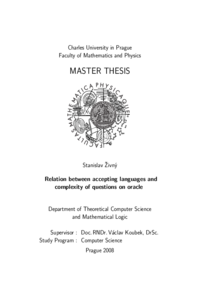Relation between accepting languages and complexity of guestions on oracle
Relation between accepting languages and complexity of guestions on oracle
rigorózní práce (UZNÁNO)

Zobrazit/
Trvalý odkaz
http://hdl.handle.net/20.500.11956/21196Identifikátory
SIS: 71980
Katalog UK: 990015585270106986
Kolekce
- Kvalifikační práce [11986]
Autor
Fakulta / součást
Matematicko-fyzikální fakulta
Obor
Teoretická informatika
Katedra / ústav / klinika
Katedra teoretické informatiky a matematické logiky
Datum obhajoby
14. 4. 2009
Nakladatel
Univerzita Karlova, Matematicko-fyzikální fakultaJazyk
Čeština
Známka
Uznáno
Označme X třídu množin, vzhledem k nimž P = NP relativizovaně a Z třídu množin, vzhledem k nimž P 6= NP. Vedle známých vlastností těchto tříd ukážeme, že úplné úlohy ponenciálních složitostních tříd a silnějších patří do X. Ukážeme, že některé úplné úlohy, pokud vůbec existují, deterministických složitostních tříd definovaných časovou složitostí větší než polynomiální a menší než exponenciální, nepatří do X. Ukážeme, že těžké problémy exponenciálních tříd nemusí nutně patřit do X. Charakterizujeme množiny z X jako množiny ležící v průniku prvního stupně rozšíření dolní a nultého stupně rozšířené horní hierarchie. Dokážeme, že X ani Z nejsou uzavřené vůči operacím průnik, sjednocení a symetrická diference. Dále dokížeme, že Z není uzavřena vůči disjunktnímu sjednocení, z čehož vyplývá, že disjunktní sjednocení může snížit složitost měřenou vztahem k rozšířené dolní hierarchii.
Denote X the class of sets relative to which P = NP relativized and Z the class of sets relative to which P 6= NP. Besides presenting known properties about X and Z, we also show that complete problems for exponential complexity classes and stronger ones belong to X. We show that some complete problems, if they ever exist, for deterministic classes between polynomial and exponential time do not belong to X. We show that hard problems for exponential classes do not generally belong to X. We characterize sets in X as the sets in the intersection of the first level of the extended low and the zeroth level of the extended high hierarchy. Further, we prove that neither X nor Z is closed under unions, intersections and symmetric differences. We also prove that Z is not closed under disjoint unions which implies that disjoint union can lower complexity measured in terms of extended lowness.
